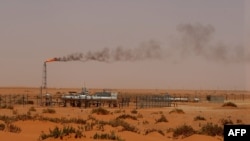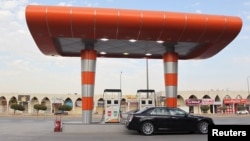The plunging price of oil is not only rattling financial markets around the world, but oil-producing countries too. As the price drops it has the potential to reshape the volatile geopolitics of the Mideast, a region at war and already in turmoil.
The price of oil will have a big impact on Saudi Arabia, Iran and Algeria, countries that are on the margin in terms of their public budgets and the rising demands from growing populations,” says Paul Salem, vice president of the Middle East Institute, a Washington-based research organization.
“I definitely think it could reshape geopolitics in the region,” he says.
Salem says there will be major political implications as a result of tumbling oil prices. In Iran, reformers are setting their sights on improving the economy, one of the drivers for agreement on a nuclear deal with Western powers in exchange for the lifting of economic sanctions. A worsening economy could affect the struggle between reformers and hardliners as they jostle ahead of next month’s parliamentary elections.
“The lower oil price makes it even more urgent for reformers to show the public something on the economy,” says Salem.
Economic reform drive
Even before the price of oil dropped below $30 a barrel, Saudi Arabia’s princes had started to plot a potentially high risk strategy to rely less on the Gulf kingdom’s vast oil wealth and to implement economic changes to cope with a future of low oil prices.
King Salman’s 30-year-old son, Muhammad bin Salman, last week outlined to the Economist magazine an ambitious blueprint for fiscal consolidation and privatization designed to cut the budget deficit, which swelled last year to 15 percent of gross domestic product, and to modernize the state.
The goal is to eliminate the deficit in the next five years. Measures could include selling shares in the national oil firm Saudi Aramco.
Free education and health care would be eliminated under the plan and so too generous subsidies for electricity, water and housing. Foreign investment would be encouraged as the state is remade.
State spending cuts in the final quarter of last year stopped the deficit from burgeoning to 20 percent of GDP. They are the first spending cuts since 2007. But the enterprise is risky, says Salem.
Sending a message
The ruling House of Saud has maintained its grip on power with heavy-handed security and largesse, using lavish spending to buy public support and quiet dissent.
“In effect they have announced an austerity program,” says Salem. He argues the recent round of executions of Sunni and Shiite opponents of the House of Saud is tied to the belt-tightening. “They wanted to signal to opponents that they will be very harsh with dissent and opposition,” he adds.
The precipitous fall in the price of oil won’t help the Saudi princes. But they do have cash to fall back on - $650 billion in foreign reserves, according to the Saudi Arabian Monetary Agency. But the kingdom burned through $100 billion in the past year alone.
Meanwhile, defense and security costs have sky-rocketed, accounting for a quarter of all government spending. And those will eat up a growing share of the national budget as the Saudis seek to counter an assertive Iran in Yemen and Syria and, at home, Shiite agitators as well as Sunni jihadists, who see the House of Saud as much their foe as the United States and the West.
Analyst David Weinberg of the Foundation for the Defense of Democracies, a research organization, believes Saudi Arabia, Qatar and the United Arab Emirates will be able to weather the drop in their oil revenue.
“Sure they are hurting but they at least have very significant financial windfalls and hundreds of billions of dollars to get them through, plus the confidence of the markets,” he says.
‘Choices to be made’
There has been widespread speculation the Arab Gulf countries may have to reduce their financial support for the Syrian rebels.
The Qatar-owned al-Jazeera satellite and cable news channel announced Tuesday it would close its troubled U.S. arm just two years after opening it. A company spokesman denied the closure had anything to do with the falling oil price, but Qatari officials acknowledged to VOA the reduction in oil revenue as well as in earnings from liquefied natural gas, whose price has also slipped, is forcing “choices to be made.”
But Weinberg doesn’t believe the Arab Gulf countries will reduce their funding of Syrian rebels. “They have shown no inclination to do so,” he says. To the contrary, he argues the tumbling oil price may “benefit Syrian insurgents” with Russia and Iran, Assad’s overseas backers, in a much tighter financial spot. “And it may act as an incentive for the Assad regime to make some concessions, which have been lacking, in the peace process so far,” he adds.
At the same time, the oil price fall is likely to hit hard on the Islamic State militant group, which relies on earnings from oil it smuggles from fields it occupies in Syria and Iraq. “The low price is limiting the value of the Islamic State’s oil asset,” Weinberg says.
But IS enemies, Iraq’s Kurds and the Iraqi government in Baghdad, are also feeling the pinch from the oil price crash.
The finance minister of Iraq’s oil-producing Kurdistan region, Masrour Barzani, warned Tuesday that economic pressures are imperiling the semi-autonomous region’s ability to pay state workers and Peshmerga fighters.
He said the West needs to pick up more of the costs of the war against Islamic militants, an argument being echoed by the Iraqi government, which is almost totally reliant on oil revenue.











